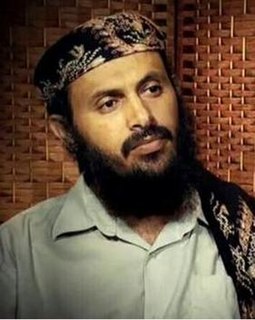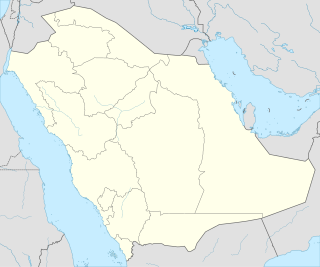Fahd, also transliterated Fahad or Fahed, can refer to:
Abdel Aziz Issa Abdul-Mohsin Al-Muqrin, alias Abu Hajr and Abu Hazim, (1971–2004), was the leader of the militant Jihadist group al-Qaeda in Saudi Arabia. He succeeded Khaled Ali Hajj, when the latter was killed by Saudi security forces in March 2004. Al-Muqrin had trained with Osama bin Laden's Al-Qaeda in Afghanistan.
Terrorism in Saudi Arabia has formerly been attributed to Islamic extremists. Their targets included foreign civilians— Westerners affiliated with its oil-based economy—as well as Saudi Arabian civilians and security forces. Anti-Western attacks have occurred in Saudi Arabia dating back to 1995. Saudi Arabia itself has been accused of funding terrorism in other countries, including Syria.

Jabir Jubran Al Fayfi is a citizen of Saudi Arabia who was held in extrajudicial detention in the United States Guantánamo Bay detention camp, in Cuba on allegations he trained and fought with al-Qaeda and the Taliban in Afghanistan in 2001.

Yussef Mohammed Mubarak al-Shihri (1985–2009) was a citizen of Saudi Arabia who was held in extrajudicial detention in the United States's Guantanamo Bay detention camps, in Cuba. He was born on September 8, 1985, in Riyadh Saudi Arabia.
Abu Omar al-Saif (1968/69-2005) was an informal name or nom de guerre of a Saudi Islamist and fighter operating first in Afghanistan (1986–1988) and later in the North Caucasus (1996–2005) as the mufti of Arab fighters in Chechnya, allegedly with close ties to al-Qaeda. His full name was Muhammad bin Abdullah bin Saif al-Buainain. He sometimes also used the name, or was addressed as, al-Jaber. He was born in 1968 or 1969 in Saudi Arabia, and was killed in Dagestan in December 2005.

Al-Qaeda in the Arabian Peninsula, or AQAP, also known as Ansar al-Sharia in Yemen, is a militant Islamist organization, primarily active in Yemen and Saudi Arabia. It was named for al-Qaeda, and states it is subordinate to that group and its now-deceased leader Osama bin Laden, a Saudi citizen of Yemeni heritage. It is considered the most active of al-Qaeda's branches, or "franchises," that emerged due to weakening central leadership. The U.S government believes AQAP to be the most dangerous al-Qaeda branch. The group established an emirate during the 2011 Yemeni Revolution, which waned in power after foreign interventions in the subsequent Yemeni Civil War.
Yusuf al-Ayeri or Yusuf bin Salih bin Fahd al-Ayeri was a Saudi Arabian member of Al-Qaeda, and the first-ever leader of al-Qaeda in Saudi Arabia.
Ali Ammar Ashur al-Rufayi, known as Abu Laith al-Libi, was a senior leader of the al-Qaeda movement in Afghanistan who appeared in several al-Qaeda videos. He was believed to have been active in the tribal regions of Waziristan. He also served as an al Qaeda spokesman. According to the Defense Intelligence Agency, he was an "expert in guerilla warfare."

Al Qaeda involvement in Asia. It is believed that members of Al-Qaeda are in hiding along the border of Afghanistan and northwest sections of Pakistan. In Iraq, elements loosely associated with al-Qaeda, in the Jama'at al-Tawhid wal-Jihad organization commanded by Abu Musab al-Zarqawi, have played a key role in the War in Iraq.

Sa'id Ali Jabir Al Khathim Al Shihri was a Saudi Arabian deputy leader of the terrorist group Al-Qaeda in the Arabian Peninsula (AQAP), and possibly involved in the kidnappings and murders of foreigners in Yemen. Said Ali al-Shihri was captured at the Pakistan border with Afghanistan, in December 2001, and was one of the first detainees held at the Guantanamo Bay detention camps, in Cuba, arriving on 21 January 2002. He was held in extrajudicial detention in American custody for almost six years. Following his repatriation to Saudi custody he was enrolled in a rehabilitation and reintegration program. Following his release, he traveled to Yemen.

Nasir Abdel Karim al-Wuhayshi, alias Abu Basir, was a citizen of Yemen and the leader of the Islamist militant group al-Qaeda in the Arabian Peninsula (AQAP). Both Saudi Arabia and Yemen considered al-Wuhayshi to be among their most wanted fugitives. In October 2014, the US State Department increased the reward for any information leading to the capture or killing of al-Wuhayshi to US$10 million, the same as ISIS leader Abu Bakr al-Baghdadi. Wuhayshi was killed in a US drone strike in the Hadhramaut Governorate of Yemen on 12 June 2015.

Qasim al-Raymi is the current emir of al-Qaeda in the Arabian Peninsula (AQAP). Al-Raymi is one of 23 men who escaped in the 3 February 2006 prison-break in Yemen, along with other notable al-Qaeda members. He next appears in connection to a July 2007 suicide bombing that killed eight Spanish tourists. In 2009, the Yemeni government accused him of being responsible for the running of an al-Qaeda training camp in Abyan province. After serving as AQAP's military commander, al-Raymi was promoted to leader after the death of Nasir al-Wuhayshi on 12 June 2015.
Younis Mohammed Ibrahim al-Hayari was a Morocco born Al Qaeda member.
Periodically Saudi Arabias Ministry of Interior publishes a most wanted list. According to Asharq Alawsat Saudi Arabia has published four lists of "most wanted" suspected terrorists, and those lists contained 19, 26, 36 and 85 individuals.

Ibrahim Hassan Tali al-Asiri was a citizen of Saudi Arabia suspected of being chief bomb-maker of al-Qaeda in the Arabian Peninsula. He was reported to have been responsible for making the bombs used by his brother Abdullah al-Asiri in his suicide bombing, the 2009 Christmas Day bomb plot, the 2010 cargo plane bomb plot, and the May 8th 2012 Terror Plot.

The Modern history of Saudi Arabia begins with the unification of Saudi Arabia in a single kingdom in 1932.

The Yemeni Civil War is an ongoing conflict that began in 2015 between two factions: the internationally recognized Yemeni government, led by Abdrabbuh Mansur Hadi, and the Houthi armed movement, along with their supporters and allies. Both claim to constitute the official government of Yemen. Houthi forces controlling the capital Sanaʽa, and allied with forces loyal to the former president Ali Abdullah Saleh, have clashed with forces loyal to the government of Abdrabbuh Mansur Hadi, based in Aden. Al-Qaeda in the Arabian Peninsula (AQAP) and the Islamic State of Iraq and the Levant have also carried out attacks, with AQAP controlling swathes of territory in the hinterlands, and along stretches of the coast.












